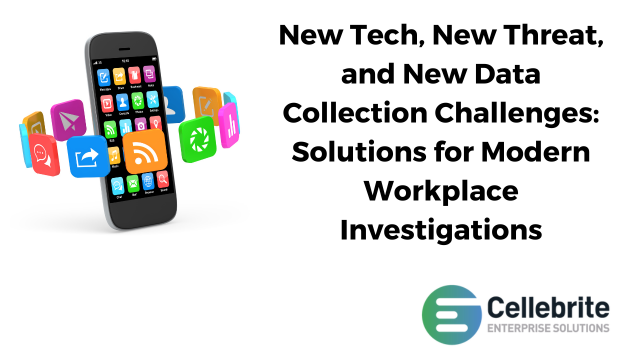
[EDRM Editor’s Note: EDRM is happy to amplify our Trusted Partners news and events. The opinions and positions are those of Monica Harris.]
Technology and workplace behavior have changed much since the pandemic. Information and knowledge are being transferred and exchanged digitally at an unparalleled rate and capacity, unlike before – and with it comes increased risk and challenges.
Corporate investigators are seeing a drastic change in the scope and reach of an investigation. As white-collar crimes continue to evolve in response to the changing technology landscape, preexisting practices and protocols often fall short in addressing new threats.
Many organizations adopt a “collect-to-preserve” approach as a best practice due to the significant risks and penalties associated with spoliation, but this comes at a high cost. Apart from the need for regular collection, these applications are updating more frequently, often for security reasons and feature advancements.
Monica Harris, Cellebrite Enterprise Solutions
In this blog, we will explore these critical gaps and offer the latest solutions to bridge them.
- BYOD in a Hybrid and Remote Workplace
The hybrid workstyle is firmly woven into our lifestyle. No longer confined to one centralized location, employees and custodians can be situated anywhere, be it in the office or their homes worldwide.
The prevalence adoption of Bring Your Own Device (BYOD) further blurs the lines between personal and business data on devices. The complexity prolongs the data collection process, despite unchanged data review deadlines.
Traveling to all employee locations and devices has become an impractical approach, not to mention the privacy concerns impeding the collection process. 69% of litigation collection experts reported collecting from mobile devices at remote locations is the most difficult.
Cellebrite’s Endpoint Inspector empowers investigators to remotely access, preserve, collect, and review data from devices, including iOS, Android, Windows, Mac, and cloud workplace applications. Instead of conducting full file collection, Endpoint Inspector allows investigators to perform selective collection targeting solely relevant data, all while safeguarding employee data.
2. Critical Data in Chat Applications at Risk
With the shift to hybrid work and the prevalence of BYOD, we’ve witnessed a significant surge in data within chat applications. Critical data now extends beyond emails in our inboxes, often being exchanged and stored across multiple chat platforms.
Many organizations adopt a “collect-to-preserve” approach as a best practice due to the significant risks and penalties associated with spoliation, but this comes at a high cost. Apart from the need for regular collection, these applications are updating more frequently, often for security reasons and feature advancements.
With Cellebrite’s Mobile Elite SaaS, investigators can gain lawful entry to third-party app data and chats, including the ability to perform full-file system, physical extractions. It grants investigators access to highly protected locations and deleted content, enabling them to uncover key incriminating evidence before it is compromised or deleted. Additionally, the infrastructure is designed for real-time, rapid adaptation to the ever-changing landscape of mobile device applications and operating system updates.
3. Manual Data Conversion and Review Process
As corporations and employees exponentially expand their digital footprints, information and data are being logged at an unprecedented magnitude. This inherently multiplies the volume, velocity, and variety of data that corporate investigators must dissect.
Legacy practices of collecting everything and culling later have become inefficient due to the vast amount of data generated across various endpoints. This approach led to significant time and cost challenges, particularly for time-sensitive investigations.
Legalview, integrated with Physical Analyzer, streamlines data analysis and review processes. It automates the conversion of raw modern data into a format that review platforms can ingest and render easily, including the Relativity Short Message Format. This allows examiners to seamlessly traverse, review, search, filter, and redact data throughout the eDiscovery process.
Conclusion
The world has evolved, and enhanced collection tools are needed now more than ever before. To effectively navigate the ever-changing landscape, organizations must be armed with best practices and leading solutions.
Cellebrite’s collection, analysis, and review ecosystem equips legal and litigation technology professionals with the right tools to stay ahead in addressing modern threats. Modern-day eDiscovery tools ensure they have the necessary capabilities to uncover key incriminating evidence during investigations and safeguard the organizations.
This blog highlights key takeaways from our on-demand webinar titled ‘We’re Not in Document Land Anymore: Modern Data Collection for Litigation Technology Professionals’. To learn more, join Monica Harris, Product Business Manager at Cellebrite, in our on-demand webinar for a deeper dive into what, when, why, and how of modern data collections for legal teams.


